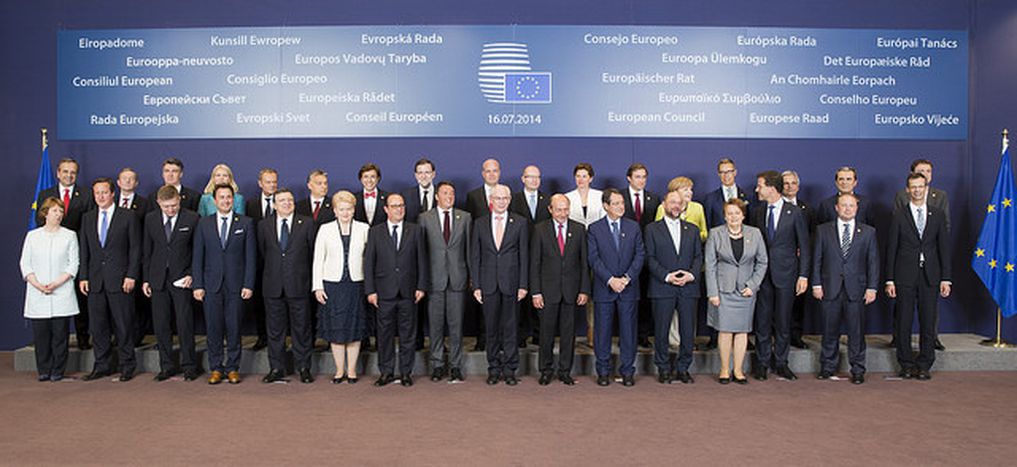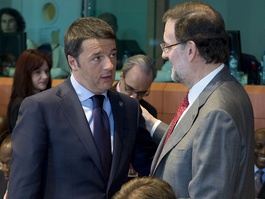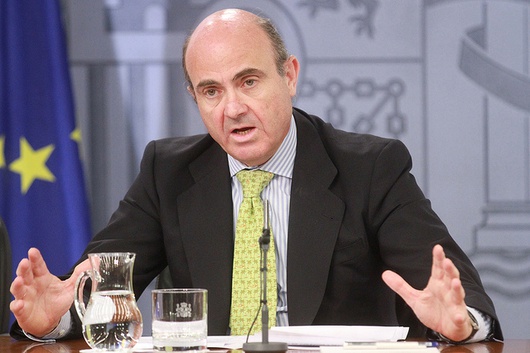
I WANNA PLAY WITH YOUR TEAM
Published on
If the European Council were a playground, for which team would Spain play? The choice is not that easy: Merkel or Renzi? Germany or Italy? Austerity or investment? And then finally: Loyalty to the centre-right family or approaching the demands of the centre-left?
Since the reform of the Spanish Constitution in 2011 agreed to by both the then ruling socialist party (PSOE) and the centre-right (PP), Spain started to carry out a series of austerity measures along the lines of rescued countries such as Greece, Portugal and Ireland. The latest episode of cuts concerns the hospitals. According to the nurse’s trade union SATSE, between 14.000 and 15.000 beds in the hospitals would be “out of service” due to the lack of newly-engaged professionals during the summer.
These austerity measures have damaged the popularity of PM Mariano Rajoy. 59,7% of Spanish people do not trust him at all, an increase from 27,2% of people who did not trust the PM two years ago, according to the official numbers of the Centre of Statistics (CIS).
 With the arrival of the socialist François Hollande to the European Council, many people thought that the austerity imposed by Germany would be over. But it has been with Matteo Renzi's performance in the 28EU club that things look like they will change. At the start of the last European Summit on July 16th, the young Italian PM said,“We are asking for respect.” The previous week he made a speech reiterating his position to combat austerity.
With the arrival of the socialist François Hollande to the European Council, many people thought that the austerity imposed by Germany would be over. But it has been with Matteo Renzi's performance in the 28EU club that things look like they will change. At the start of the last European Summit on July 16th, the young Italian PM said,“We are asking for respect.” The previous week he made a speech reiterating his position to combat austerity.
The question now is if Spain will join the Italian team or keep to the German one. Being opposed to Germany in the Council is very risky, since Germany is the delegation with the highest number of votes. Furthermore, Angela Merkel and Mariano Rajoy are in the same political family. On the other hand, a change in Rajoy’s measures could help the centre-right to gain votes for the coming general elections to be held in 2015.
The Spanish PM has never been clear in his position between German austerity and Italian flexibility.
playing your cards in the council
The European Council is the High Institution of the European Union where the Heads of State of the 28 Member States gather together. One could say that this is the least “community method” institution, since it is here where we can see the position of each Member State individually. However, no single country is able to act as an individual, so alliances are necessary. Here we have thus the great “game of thrones” in the European Union.
The Council shares with the European Parliament the power to approve or reject legislation. But the prior task of the Council during this summer (after the European Elections on 25th May) is to appoint who will chair the highest positions. So forget about legislation that affects citizens; now it is time for pure politics.
Meeting an agreement is sometimes a Herculean task, but no Hercules or Zeus sit on the European Council. Here we have Angela Merkel and Matteo Renzi. The German chancellor insists in keeping the austerity measures agreed upon in the Pact of Stability. On the other hand, the newly elected Italian Prime Minister is pushing to open the pursestrings (maybe of Pandora) of investment and flexibility. These are basically the two ends of the line.
Nevertheless, with 28 players the negotiations become more complex. Home affairs, party compromises, and the electorate demands play a role in the negotiations.
A CHAIR FOR SPAIN
 Far from the measures that affect the Spanish population, the interest of Rajoy is now the institutional discussions to give away the “European thrones.” Juncker already took his sit as President of the European Commission, Italy is fighting to get the Foreign Office for Federica Mogherini, and Denmark could obtain the presidency of the European Council itself. The next chair available is the President of the Eurogroup, the group of Finance Ministers of the Eurozone. Actually, that was the chair occupied by Juncker since its creation in 2005 until 2013, when the Dutch Jeroen Dijsselbloem took office, a post that he does not want to leave now. It is not without surprise that all the Member States except the Netherlands would back Luis de Guindos, the current Spanish Finance Minister.
Far from the measures that affect the Spanish population, the interest of Rajoy is now the institutional discussions to give away the “European thrones.” Juncker already took his sit as President of the European Commission, Italy is fighting to get the Foreign Office for Federica Mogherini, and Denmark could obtain the presidency of the European Council itself. The next chair available is the President of the Eurogroup, the group of Finance Ministers of the Eurozone. Actually, that was the chair occupied by Juncker since its creation in 2005 until 2013, when the Dutch Jeroen Dijsselbloem took office, a post that he does not want to leave now. It is not without surprise that all the Member States except the Netherlands would back Luis de Guindos, the current Spanish Finance Minister.
The problem comes when talking about the Commissioner proposed by Spain. Miguel Ángel Arias Cañete, who has been the Agriculture Minister until he resigned from his job to lead the list of the Popular Party for the European Elections, wanted the Commission of Agriculture from the very beginning. Rajoy is trying to get it, but Juncker already asked to the Spanish Prime Minister to propose a woman as candidate for the Commission. Funny coincidence: Cañete said after a televised electoral debate that debating with a woman is complicated, since a man would not show his superiority. Now the gender parity in the European Institutions could prevent him from taking the ambitious post.
In Spanish we use the idiom “bailar con la más fea” (dancing with the ugliest one) when you get the worst part of something. Might Spain dance with the prettiest one this time?



